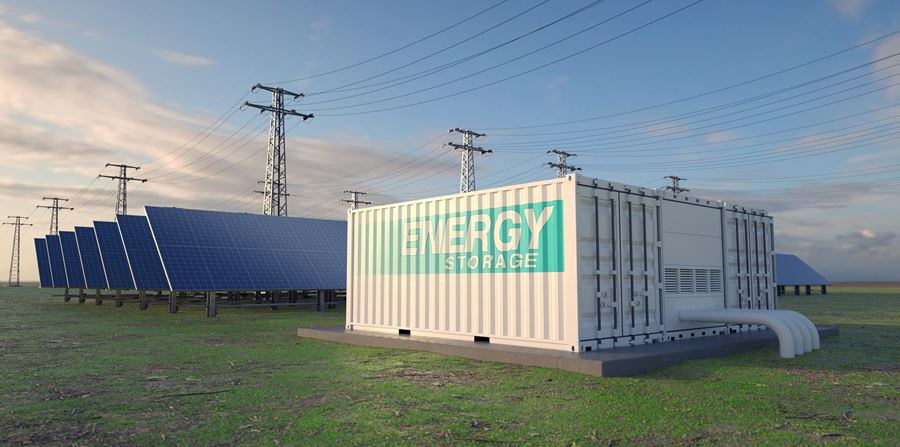Powering the Future: Battery Energy Storage Systems and Their Insurance Implications

The world's energy landscape is undergoing a significant transformation. As we strive for a more sustainable future, renewable energy sources like solar and wind power are playing an increasingly crucial role. However, these sources have a well-known drawback: intermittency. Sunshine doesn't always shine, and the wind doesn't always blow. This variability creates challenges for maintaining a stable and reliable electricity grid.
Enter Battery Energy Storage Systems (BESS), innovative technologies that are revolutionising how we manage and utilise energy. Let's delve into the world of BESS, exploring their functionality, their importance in the renewable energy future, and the potential risks they pose from an insurance perspective.
What are BESS?
BESS essentially function as giant rechargeable batteries. They capture excess electricity generated during peak production periods from renewable sources like solar and wind farms. This energy is then stored electrochemically within the batteries and released back into the grid when demand is high or during periods of low renewable energy production.
A typical BESS consists of multiple battery units, power conversion systems, and a control system. The control system plays a critical role, intelligently managing the charging and discharging cycles to optimise energy storage and grid stability. Lithium-ion batteries are currently the dominant technology used in large-scale BESS due to their high energy density and efficiency.
Why Do We Need BESS?
The integration of renewable energy sources into the grid presents challenges, such as intermittency and peak demand. Solar and wind power generation fluctuates with weather conditions. This inconsistency can lead to imbalances between supply and demand, potentially causing power outages or grid instability. Additionally, electricity demand typically surges during specific times of the day. Without sufficient generation capacity at those times, relying solely on renewables can lead to price spikes and strain on the grid.
BESS offer solutions to these challenges by smoothing out variability, managing peak demand, and integrating renewables. By storing excess renewable energy and releasing it strategically, BESS can help balance supply and demand, ensuring a more consistent and reliable power flow. Secondly, BESS can be discharged during peak demand periods, reducing reliance on expensive and environmentally harmful fossil fuel peaker plants. BESS can also facilitate the integration of a higher percentage of renewables into the grid, accelerating the transition towards a cleaner and more sustainable energy future.
Beyond these primary benefits, BESS offer additional advantages. BESS can help regulate grid frequency and voltage, minimising power fluctuations and reducing the risk of blackouts, they can participate in ancillary service markets, providing grid operators with additional tools to manage the grid efficiently, and they can provide backup power during outages, enhancing grid resilience and improving community preparedness for natural disasters.
The Insurance Landscape for BESS
As BESS technology continues to evolve and gain wider adoption, the insurance industry needs to adapt to assess and manage the associated risks. Here's a closer look at some key insurance considerations:
- Property Damage: BESS contain a significant amount of stored energy, and like any electrical system, they are susceptible to potential fire hazards.
- Business Interruption: Damage to a BESS system can lead to business interruption for the owner or operator, resulting in lost revenue and potential contractual penalties.
- Cybersecurity Threats: The control systems managing BESS are vulnerable to cyberattacks. Malicious actors could disrupt operations or cause intentional damage.
- Environmental Risks: Lithium-ion batteries used in BESS pose potential environmental risks if not handled or disposed of properly. Leakage or fire can result in contamination and significant clean-up costs.
- Operational Risks: Improper maintenance, malfunctions during charging/discharging cycles, or software bugs in the control system could lead to damage or even catastrophic failure.
These risks necessitate a comprehensive insurance approach for BESS. Some potential coverage areas include:
- Property Damage: Standard property insurance policies can be adapted to cover physical damage to BESS components.
- Business Interruption: Insurance can help recover lost revenue if a BESS system is damaged and needs repair or replacement.
- Contingent Business Interruption: Coverage can be extended to cover losses incurred by a third party if a BESS malfunction disrupts their power supply.
- Cybersecurity: Insurance solutions are emerging to protect against financial losses caused by cyberattacks on BESS control systems.
- Pollution and Environmental Liability: Insurance can help manage the costs associated with environmental damage caused by BESS failures.
The specific insurance needs of a BESS project will depend on various factors like size, location, technology used, and intended application. BESS owners and operators must work closely with risk management consultants and insurance brokers to develop a comprehensive risk mitigation and insurance strategy.
Typical BESS Insurance Claims
While BESS technology is maturing, the field is still relatively young. The exact nature of BESS insurance claims continues to evolve, but some common themes emerge like fire damage, component failure, natural disasters, cybersecurity incidents, or environmental damage.
Fire Damage: Thermal runaway is a significant concern with lithium-ion batteries. Faulty cells or improper management can lead to overheating, fire, and extensive damage to the BESS system and potentially surrounding structures.
Component Failure: Individual battery modules, power conversion systems, or control system malfunctions can occur due to manufacturing defects, improper installation, or wear and tear.
Natural Disasters: Events like lightning strikes, floods, or earthquakes can damage BESS infrastructure, leading to property damage and business interruption claims.
Cybersecurity Incidents: Malicious cyberattacks targeting BESS control systems could disrupt operations, cause physical damage, or lead to data breaches.
Environmental Damage: Improper battery handling or disposal practices can result in environmental contamination, triggering pollution liability claims.
It's important to note that this is not an exhaustive list, and the specific types of claims will vary depending on the circumstances. However, it highlights the importance of a comprehensive insurance program that considers the unique risks associated with BESS technology.
By understanding the benefits, risks, and insurance considerations surrounding BESS, stakeholders can make informed decisions about this transformative technology. As BESS continues to play a growing role in the energy landscape, the insurance industry will continue to adapt and develop innovative solutions to manage the associated risks, paving the way for a more sustainable and secure energy future.
Nuestros consultores están listos para ayudar.


